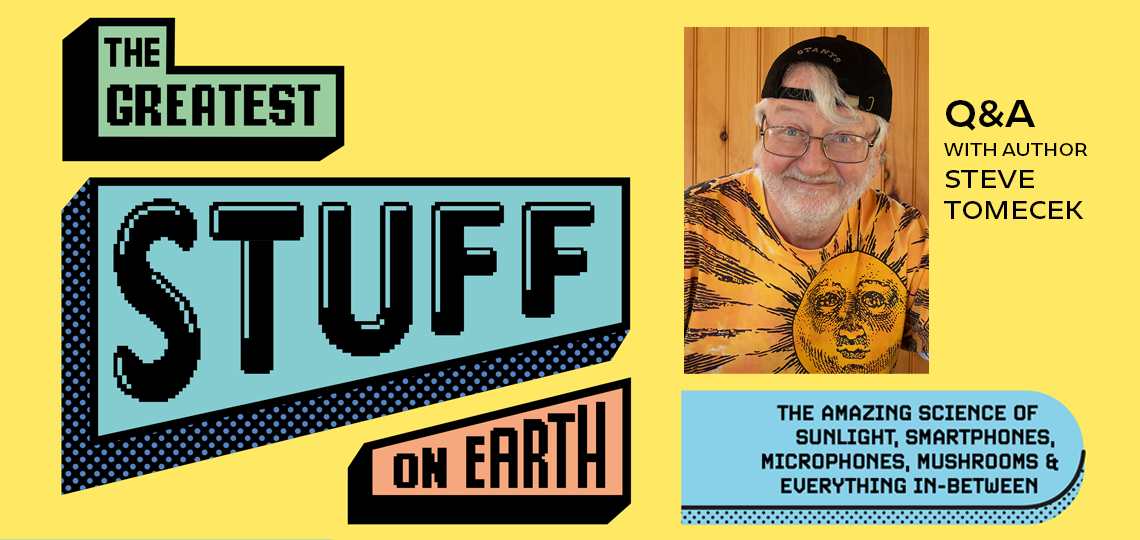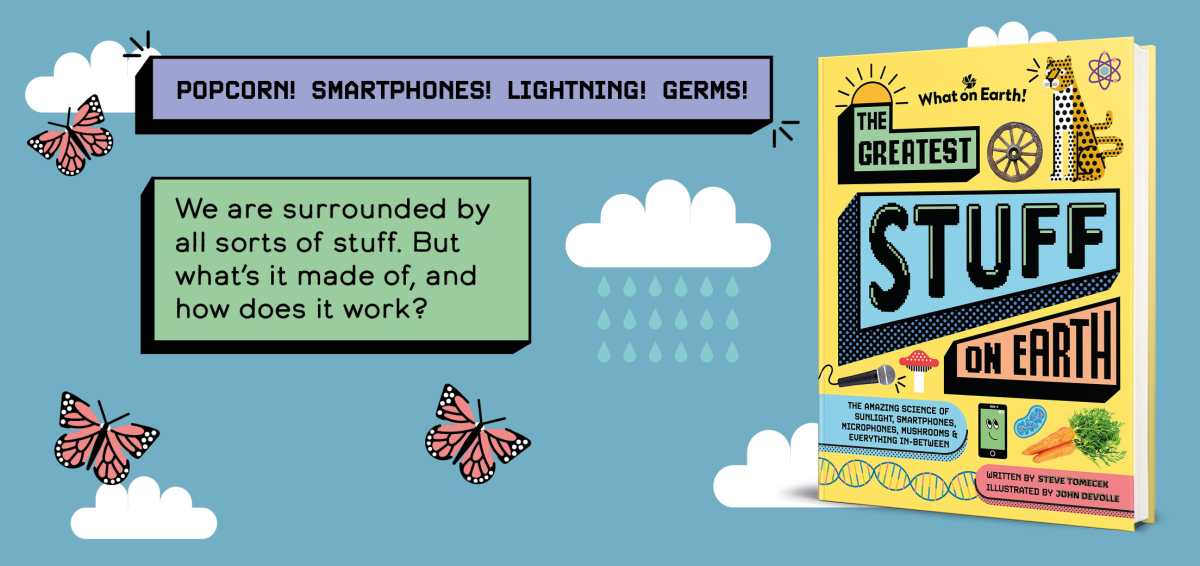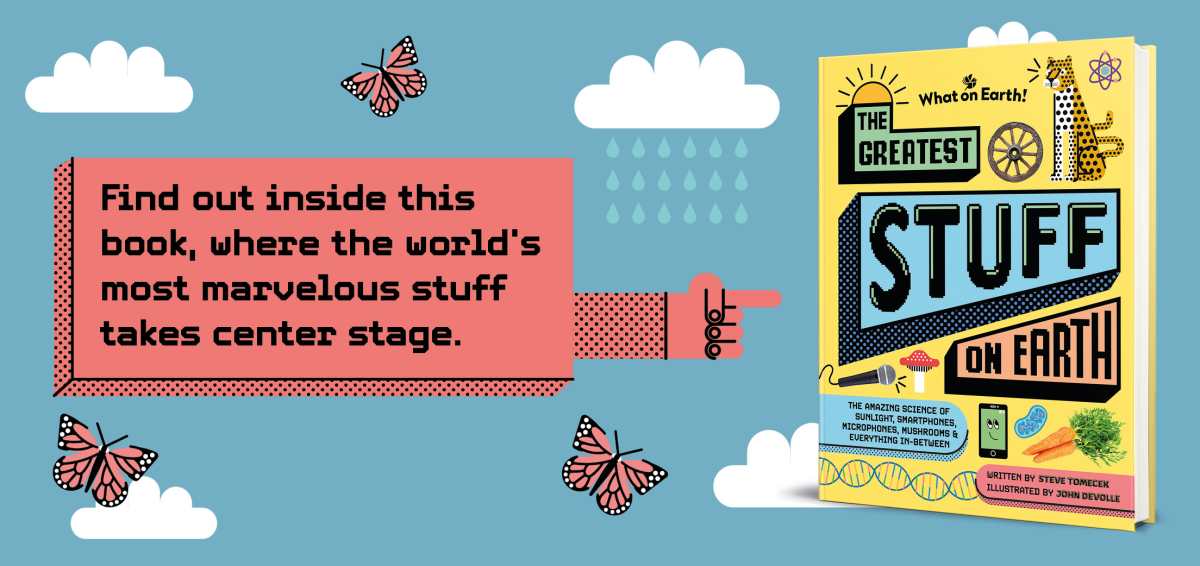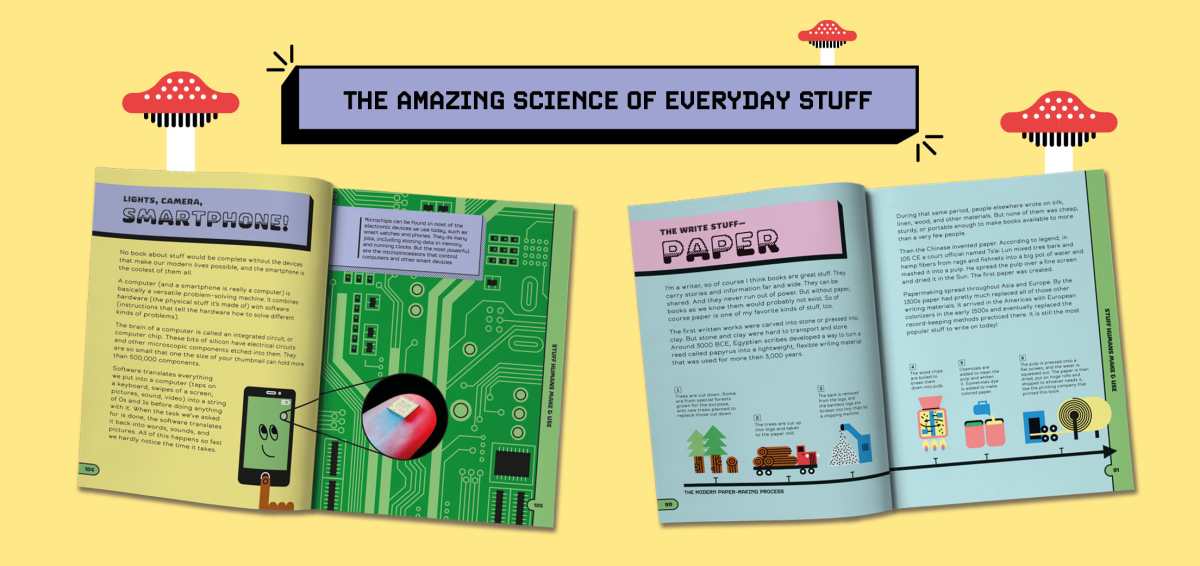The Greatest Stuff on Earth

An Interview with Steve Tomecek, Author of The Greatest Stuff on Earth
Sometimes, all it takes to get a kid hooked on science is one amazing individual. Steve “the Dirtmeister” Tomecek is one such person. A trained scientist himself, he has devoted his life to encouraging kids to see science as an adventure. The author of more than forty-five books for children and their teachers from National Geographic, Scholastic, Discovery, and many others, he has also practiced his enthusiastic style of science education on the radio, on television, in museums, and in countless classrooms. Steve’s latest book, The Greatest Stuff on Earth (What on Earth!, $19.99), will hit the shelves in March, and the moment seemed perfect to connect him with Willem Marx, one of Foreword’s top writers.
Enjoy the conversation.
It’s a joy to see how The Greatest Stuff on Earth makes basic scientific facts—the groundwork of the world we live in—vital and thrilling. Given that so much of this information is taught to students in grade school, and promptly forgotten in many cases, do you agree that there’s a reluctance to study science? If so, what is it rooted in and how would you change the way children are introduced to science?
Children are natural born scientists, they have a desire to discover what their world is all about, and they start making observations about the “stuff” around them and the way things work at an early age. But problems can arise when the emphasis in school shifts to students memorizing facts and passing the tests rather than following their own curiosity about how scientific principles work and how they relate to events in their own lives. As a scientist, I learned early on that science is more than a collection of facts, it’s a process and a way of looking at the world. When I work with kids (and their teachers), I try to get them to think of the word “science” as a verb. I think that as more educators approach science this way, students will be naturally drawn to it and more of them will seek out careers in STEM.
Beyond being an excellent introduction to the natural phenomena and elements of earth, your book makes an implicit case that it’s important for people to understand the world they live in. Why do you think that’s true? What happens, on both a societal and individual level, when we don’t understand the scientific truths that govern our lives?
Wow! I could write an entire book on this question, but the short answer is that people need to have a basic understanding of how things work in order to make informed decisions about their daily lives. We are constantly being bombarded by information concerning what purchases to make, what medicines we should take, and how we choose to vote. Unfortunately, we live in a world full of misinformation and even disinformation where science itself is under attack. This noise makes it really difficult to sort out fact from fiction. The more people understand about the phenomena and processes that govern their lives, the better equipped they are to assess the information swirling around them and make decisions that ultimately best serve their needs—and the needs of society as a whole. It is much harder for someone to be manipulated if they have a basic understanding of the way things actually work. Francis Bacon said “knowledge is power” way back in 1597, and his words still ring true today.
One of the remarkable things about this book is the way it integrates geology, meteorology, biology, astrophysics, and a host of other disciplines in explaining our planet. Is it difficult to cross these scientific boundaries and weave them together into a cohesive whole? What is the value of this sort of interdisciplinary work?
To be honest, the splitting of science into a bunch of specialized and separate disciplines is a relatively new phenomenon. Before there were “scientists” (the term wasn’t even used until the 1830s), there were “natural philosophers” who tried to make sense of the many different phenomena that govern our world. People like Aristotle, Hypatia, da Vinci, Newton, Descartes, and good old Ben Franklin worked across different disciplines, and they helped push the boundaries of what we now call science forward. I probably have an advantage in crossing disciplines because to be a geologist you have to have a good working knowledge of chemistry, physics, and biology. Without them, it’s impossible to understand how things like earthquakes, volcanoes, and rocks form. Being able to work across different scientific disciplines allows you to see the big picture instead of just a tiny piece of it.
Given the many inventions you explore, what would you say is humanity’s most exciting, impressive, or simply engaging creation? Why?
Kids ask me this all the time and I honestly don’t have a single answer because each new invention often leads to other, better inventions. But if I must choose one, I’d have to say the development of complex language and the ability to write stuff down … Okay, that’s two separate inventions, but being able to communicate one’s thoughts and to then pass that information down to future generations is what I think separates humans from the rest of the animal kingdom.
I’m intrigued by the way The Greatest Stuff on Earth not only explains the science behind tools and technologies, but also takes these complex innovations—the battery, refrigeration, the oven, the electric motor of EVs—back to their roots hundreds of years in the past. In a sense, this is a history book as much as it is a science book. Why did you choose to bring history and science together in this way? What role does history play in scientific study?
I think that it’s incredibly important for kids (and adults for that matter) to understand that the “stuff” we have in our modern-day world didn’t just magically appear. Just about everything we use today came about as the result of a long line of discoveries and creations where one person built on the work of someone who came at an earlier time.
When I was in college, I watched a television series written by James Burke called Connections in which he traced the origins of modern-day technologies and showed how even simple things often have a complex history. It really opened my eyes to the role that history plays in the development of science and technology so whenever I write about “stuff” I always try to bring in the history and talk about the people who made it possible. When I visit schools, students love to hear me tell the stories of the people behind the “stuff.” It adds a human touch that we could use more of.
While you address some of the human-induced environmental and climactic problems we face today, the book ends on an optimistic note. What is your message to people concerned about issues like global warming, pollution, and nuclear disaster?
The message is a simple one. Over the years we’ve created some great stuff that has improved our lives enormously, but sometimes that same stuff has had negative impacts on our world. In most cases, we already have the science and technology needed to fix these problems, but for a variety of reasons, we drag our feet when it comes to implementing the solutions. Right now, I think climate change is the biggest crisis facing our planet because no one knows for sure what all the impacts will be or how fast they will happen. We have the technology available to reduce the amount of greenhouse gases that we are releasing into the atmosphere right now, but it will cost money, and it also means that we humans will have to make significant changes to the way we live. That’s not an easy thing to sell.
In some fields of modern technology—I’m thinking of AI-research, in particular—there are concerns about whether or not progress is an absolute good. Where do you fall on this question? Are there situations where you think scientific advancement should be interrupted or better controlled?
Oh yes, no question. The issue is that sometimes the development of a new technology happens faster than our understanding of all the impacts that it can have. That was the case with nuclear power—we still don’t have a safe way of disposing of the waste. Genetic engineering and AI also come with a set of unintended consequences that are impossible to fully predict. Progress is essential to humanity, but I think that slowing down a bit to consider the impact it will have would only be a good thing for us all. To quote Ian Malcom from Jurassic Park: “Your scientists were so preoccupied with whether or not they could, they didn’t stop to think if they should.”
There are no clear timelines for scientific progress, some discoveries take a decade, others take hundreds and even thousands of years. That said, are there any innovations or ideas in the works that you are anticipating? How would you like to see technology advance in the coming decade?
It’s been very exciting for me to see how quickly scientists and engineers are re-writing the way that energy will be collected and distributed in the future. To pull this off takes a mix of people working in ceramics and nanotechnology, superconducting materials, and efficient solar energy systems. It’s a great example of cross-disciplinary collaboration that has the potential to change the world for the better.
How would you say that your scientific expertise colors the way you interact with the world? Do you notice the science of things around you in your daily life?
Absolutely! I love trying to figure out the processes behind everyday phenomena. I actually got my start doing this long before I trained to be a scientist. I spent my childhood summers with my Uncle Joe in a place called Pottsville, Pennsylvania, which was surrounded by coal mines. Uncle Joe and I used to take long walks in the woods. I still remember finding my first fern fossil when I was about seven years old and listening, rapt, as he told me how those plants filled giant swamps millions of years ago and over time turned into the coal that we burned in the stove to heat the house. Uncle Joe never even graduated from elementary school, but he knew science and he taught me how to observe the world and most importantly, to ask questions about it. Now, I’m doing the same thing with my granddaughter Lorenza, to whom the book is dedicated. She’s just turning three years old, but she’s already doing science by making keen observations and trying to figure out how things work. She, and millions of other curious kids just like her, are why I do what I do. They give me hope that in the future our world will be in good hands.
Willem Marx



